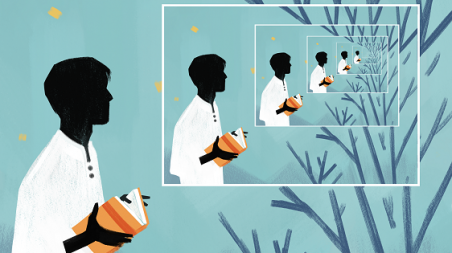The French word for “already seen,” Deja Vu, literally translates to “already seen.” It’s the feeling of having seen something before, combined with the awareness that you haven’t actually seen it. It’s been hypothesized that this occurs when two distinct lines of thinking collide, much like a minor “glitch” in the brain.
INTRODUCTION
Upwards of 97% of people are thought to have experienced it at least once, and more than two-thirds of people experience it on a somewhat regular basis, making it a very common occurrence.
You’ve probably experienced this before: you’re in the middle of a conversation or an activity when suddenly you’re hit with the unshakeable conviction that you’ve had this experience before, even though you know that can’t be the case.
When you have déjà vu, your brain creates the impression that you’ve experienced a particular situation before, even though you can’t recall it from memory and can’t put a name to it.
WHAT CAUSES DÉJÀ VU TO HAPPEN?
Even if you’re not a master of illusion, your brain is still at work when you have déjà vu. The breakdown in communication between different regions of the brain is thought to be to blame for this.
“When you experience déjà vu, it’s because of broken communication between brain regions involved in remembering and recognizing things.
Each side of your head, just above your temples, contains a temporal lobe. They’re crucial for facilitating:
Think of a word you remember.
Recall the locations you’ve visited in the past.
Find the faces.
Know how to communicate.
Feel what other people are feeling.
The hippocampus, located in each temporal lobe, helps with a variety of tasks and stores recent memories. Your hippocampus and other brain tissue can become activated on rare occasions, such as during certain types of seizures, leading to memory experiences like déjà vu.
To paraphrase the author: “This causes a disruption of recognition memory systems, which gives you that false sense of familiarity,”
IS DÉJÀ VU NORMAL?
The occasional occurrence of déjà vu is neither unusual nor harmful. People between the ages of 15 and 25 have the highest risk, and that risk gradually declines after that. Evenings and weekends see a higher incidence rate than weekdays.
Other facts about déjà vu are known, though their causes remain a mystery to scientists. You might be more prone to experiencing déjà vu if you:
– be highly educated.
– Take a lot of trips.
– keep your goals in mind.
– Adopt a tolerant outlook.
According to Dr. Khoury, déjà vu only happens a few times a year in healthy people. However, it’s crucial to seek treatment if the occurrences increase in frequency or if they’re accompanied by other symptoms.
DO WE EVER NEED TO WORRY ABOUT IT?
Feelings of déjà vu can be an indicator of serious health problems.
Experiencing déjà vu can be a symptom of stress, exhaustion, or neurological conditions such as seizures, migraines, or memory loss. For instance, those with frontotemporal dementia are more likely to suffer from chronic deja vu and attempt to rationalize it away.
If you also experience symptoms as below in addition to your déjà vu, you may want to see a doctor.
- Confusion
- Headaches
- Absence of perception
- Weakness
- Seizures
- Shaking
WHAT TO DO WHEN DÉJ VU HINTS AT TROUBLE
It’s probably not a big deal if you have a “I’ve been here before” feeling every once in a while. More frequent cases of déjà vu, however, warrant a trip to the doctor. If you have experienced déjà vu frequently, it may be time to see a doctor, especially if:
- occurs frequently (at least once a month) as opposed to infrequently (once a year).
- causes a lapse in consciousness afterward.
- is accompanied by strange, dream-like recall or imagery
- it manifests itself through behaviors such as unconscious chewing and fumbling as well as physiological changes like a racing heart and an overwhelming sense of dread.
CONCLUSION
Don’t dwell on disturbing or recurring deja vu. You should talk to your doctor or see a neurologist if you are unsure what is causing your deja vu.

